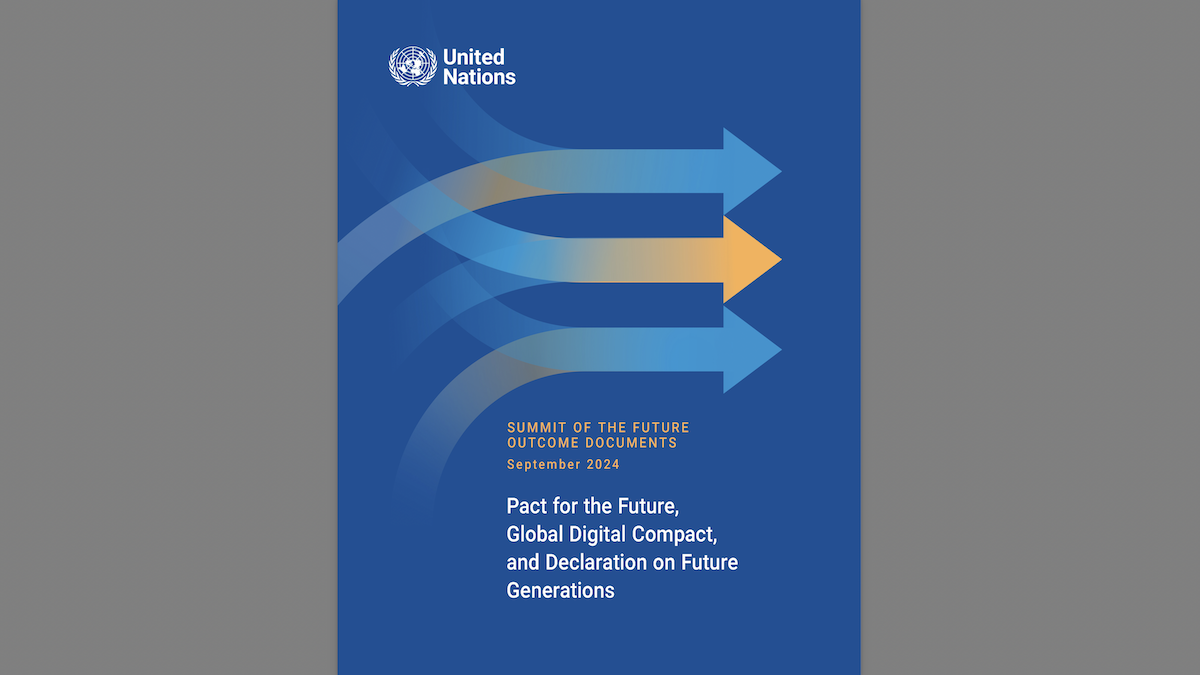Pact for the Future
UN. Pact for the Future. An inter-governmentally negotiated, action-oriented Pact.
Objective 5. Enhance international governance of artificial intelligence for the benefit of humanity (page 52)
50. We recognize the need for a balanced, inclusive and risk-based approach to the governance of artificial intelligence (AI), with the full and equal representation of all countries, especially developing countries, and the meaningful participation of all stakeholders.
51. We recognize international, regional, national and multi-stakeholder efforts under way to advance safe, secure and trustworthy artificial intelligence systems. We urgently need to inclusively assess and address the potential impact, opportunities and risks of artificial intelligence systems on sustainable development and the well-being and rights of individuals.
52
International cooperation is required to promote coordination and compatibility of emerging artificial intelligence governance frameworks.
52. We commit to advance equitable and inclusive approaches to harnessing artificial intelligence benefits and mitigating risks in full respect of international law, including international human rights law, and taking into account other relevant frameworks such as the Recommendation on the Ethics of Artificial Intelligence of the United Nations Educational, Scientific and Cultural Organization.22
53. We recognize the immense potential of artificial intelligence systems to accelerate progress across all the Sustainable Development Goals. We will govern artificial intelligence in the public interest and ensure that the application of artificial intelligence fosters diverse cultures and languages and supports locally generated data for the benefit of countries and communities’ development. This includes, in particular, international cooperation to support developing countries in building artificial intelligence capacities as well as efforts to address potential negative impacts of emerging digital technologies on labour and employment and on the environment.
54. We consider that international governance of artificial intelligence requires an agile, multidisciplinary and adaptable multi-stakeholder approach. We recognize that the United Nations has an important role to play in shaping, enabling and supporting such governance.
55. We have a unique opportunity, through this Compact, to advance international governance of artificial intelligence in ways that complement international, regional, national and multi-stakeholder efforts. We will:
(a) Assess the future directions and implications of artificial intelligence systems and promote scientific understanding (all SDGs);
(b) Support interoperability and compatibility of artificial intelligence governance approaches through sharing best practices and promoting common understanding (all SDGs);
(c) Help to build capacities, especially in developing countries, to access, develop, use and govern artificial intelligence systems and direct them towards the pursuit of sustainable development (all SDGs);
(d) Promote transparency, accountability and robust human oversight of artificial intelligence systems in compliance with international law (all SDGs).
56. We therefore commit to:
(a) Establish, within the United Nations, a multidisciplinary Independent International Scientific Panel on AI with balanced geographic representation to promote scientific understanding through evidence-based impact, risk and opportunity assessments, drawing on existing national, regional and international initiatives and research networks (SDG 17);
(b) Initiate, within the United Nations, a Global Dialogue on AI Governance involving Governments and all relevant stakeholders which will take place in the margins of existing relevant United Nations conferences and meetings (SDG 17).
53
57. We therefore request the President of the General Assembly to appoint at the seventy-ninth session of the General Assembly co-facilitators, one from a developed country and one from a developing country, to identify, through an intergovernmental process and consultations with other relevant stakeholders, the terms of reference and modalities for the establishment and functioning of the Independent International Scientific Panel on AI and the Global Dialogue on AI Governance for the adoption by the General Assembly.
58. We call on standards development organizations to collaborate to promote the development and adoption of interoperable artificial intelligence standards that uphold safety, reliability, sustainability and human rights (SDGs 3, 5, 7, 9, 10, 12, 16 and 17).
59. We will promote safe, secure and trustworthy artificial intelligence systems that advance, protect and preserve linguistic and cultural diversity and that take into account multilingualism throughout the life cycle of these systems (SDGs 10 and 16).
60. We encourage the development of international partnerships on artificial intelligence capacity-building to develop education and training programmes, increase access to resources including open artificial intelligence models and systems, open training data and compute, facilitate artificial intelligence model training and development, and promote the participation of micro-, small and medium-sized enterprises in the digital economy (SDGs 4 and 17).
61. We will leverage existing United Nations and multi-stakeholder mechanisms to support artificial intelligence capacity-building to bridge artificial intelligence divides, facilitate access to artificial intelligence applications and build capacity in high-performance computing and related skills in developing countries (all SDGs).
62. We will promote North-South, South-South and triangular cooperation to support the development of representative high-quality data sets, affordable compute resources, local solutions that reflect linguistic and cultural diversity and entrepreneurial ecosystems in developing countries (SDGs 4, 9, 10 and 17).
63. We emphasize the importance of increased investment, particularly from the private sector and philanthropy, to scale up artificial intelligence capacity- building for sustainable development. We request the Secretary-General, in consultation with potential contributors and the United Nations system, to develop innovative voluntary financing options for artificial intelligence capacity-building that take into account the recommendations of the High- level Advisory Body on Artificial Intelligence on a Global Fund on AI and that are complementary to relevant United Nations funding mechanisms and to submit these for consideration by the General Assembly at the seventy-ninth session.


